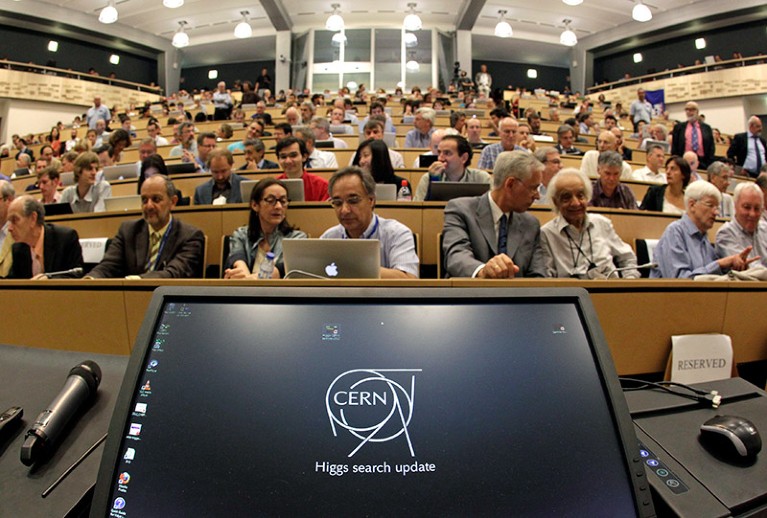
The CERN amphitheatre. Hundreds of Large Hadron Collider publications had been in limbo over how to list some of the authors’ affiliations.Credit: Denis Balibouse/AFP via Getty
Physicists who work on experiments at the Large Hadron Collider (LHC) say they have settled a dispute over how to acknowledge authorships of Russian and Belarussian scientists on their research papers — one of the tensions that has affected global physics collaborations since Russia’s invasion of Ukraine in February 2022.
Since March 2022, more than 250 manuscripts reporting LHC results have appeared on preprint servers without any author names, affiliations, or funder details. But their progress to peer-reviewed publication had been frozen while scientists argued about how to list authors. Journals had formally accepted more than 100 of these papers and sometimes made them available on their websites, listing them as ‘in press’ — but without an author list. The agreements, quietly reached in early February, should mean that journals can now proceed to formal publication.
CERN, the European particle-physics laboratory near Geneva, Switzerland, manages the LHC accelerator, while the detectors along its 27-kilometre ring are built and run by independent collaborations, made of researchers from countries worldwide. More than 1,000 Russian scientists work at CERN, many of them on experiments at the LHC. After the war began, CERN’s council decided to allow researchers with Russian affiliations to continue working there under the country’s existing ‘observer’ status, but to let its existing agreements with Russia and its ally Belarus lapse when they end in 2024. The council also voted to suspend any new collaborations and contracts with the two countries.
Meanwhile, some researchers working on LHC experiments said that they did not want their work co-authored with Russian scientists — or that they could accept sharing authorship as long as their colleagues’ Russian institutions or funding agencies were not mentioned. Some government science funders, including in Poland and Ukraine, supported this stance. But Poland’s science ministry pointed out that the country’s institutions must annually list all of their publications with proof of the ministry’s funding support — nixing the idea that journals could simply publish papers with author names only, and no funding details or affiliations.
After almost a year of debate, researchers on collaboration boards of the LHC’s four largest experiments — ALICE, ATLAS, CMS and LHCb — have now voted by majority to reach a technical solution. Papers will list most authors with their affiliations and their Open Researcher and Contributor ID (ORCID), an identifier that leads to a profile page where scientists can choose to list their institutions. But Russian and Belarussian researchers will be listed only with their ORCID, and a note that they are affiliated with an institute or laboratory “covered by a cooperation agreement with CERN”, a CERN spokesperson tells Nature. Journals will be allowed to include full author and affiliation lists in computer-readable metadata. The spokesperson said that some details are still under discussion, including guidelines for the use of metadata, and how details of funding agencies will go into papers. (One suggestion is that Russian funders won’t be visibly mentioned, but might be included in the metadata.)
The solution differs from a compromise reached by researchers with another international physics experiment, Belle II, at Japan’s High Energy Accelerator Research Organization (KEK) in Tsukuba.
In June 2022, they declared that papers would list the names of authors only. Then in October, the collaboration revised that position, so that authors would be listed with their ORCID but not their affiliation, and that funders would be recognized in an acknowledgments list, although with a footnote adding that the acknowledgments “are not to be interpreted as an endorsement of any statement made by any of our institutes, funding agencies, governments, or their representatives”.

